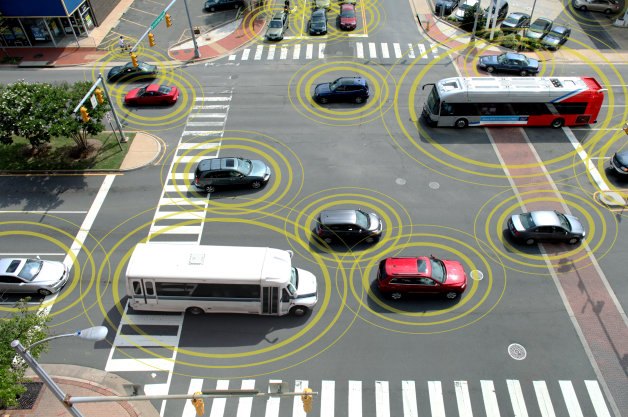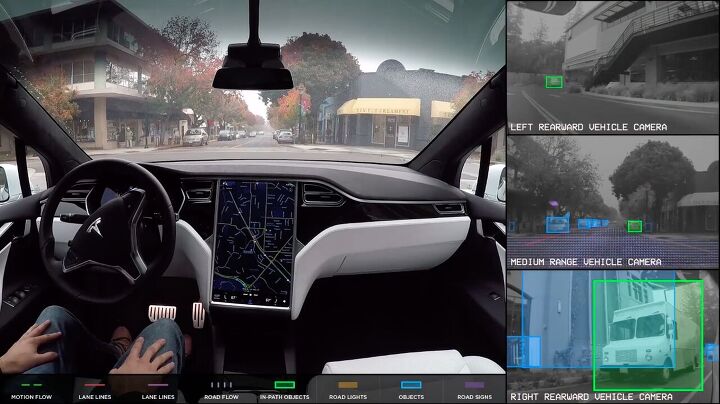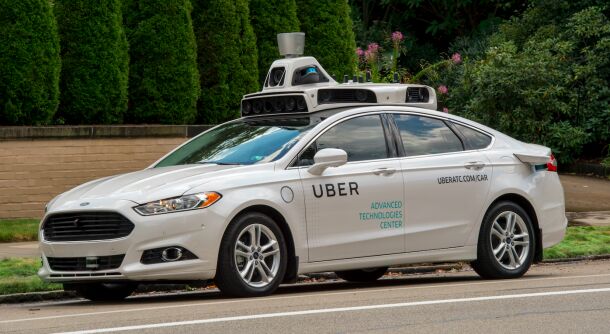#Self-drivingCars
Elon Musk Presses for Total Ban on Autonomous Weapons, Self-driving (Potential) Killer Cars Still Okay
The United Nations recently voted to begin formal discussions on autonomous weapon systems, with 116 of the world’s leading robotics and artificial intelligence experts responding by calling on governments to simply ban them.
The coalition, fronted by Tesla’s Elon Musk and Alphabet’s Mustafa Suleyman, claims this is a dark road the world doesn’t want to go down. Aimed at the International Joint Conference on Artificial Intelligence, a letter from the group warned the U.N. not to usher in the “third revolution in warfare” (following gunpowder and nuclear arms).
While I’m not about to suggest there aren’t serious risks involved with weaponizing thinking machines, it does seem lightly hypocritical for Musk to condemn them over a lack of trust while continuing to champion self-driving cars. Apparently, technology experts feel a Terminator scenario is thoroughly unacceptable but a potential Maximum Overdrive situation is just fine.
Money-hungry States Lining Up to Tax Self-driving Cars (Just Like EVs)
There’s few things people living in the U.S. can agree on, but one of those things is the state of American road infrastructure. For the most part, it sucks. Eisenhower’s long gone, but his network of interstate highways, plus the spiderweb of two-lane roadways cross-crossing every corner of America haven’t grown better with age.
Meanwhile, the U.S. federal gas tax remains unchanged since its last hike in 1993. Still locked at 18.4 cents per gallon, the infrastructure funding shortfall created by the static federal tax is spurring states to pass their own gas tax increases. Michigan, California, and — controversially — New Jersey are among the most recent examples.
Still, boosting prices at the pumps only works if drivers still visit those pumps. What of the coming self-driving car wave, the vanguard of which are high-tech electric vehicles piloted by mere humans? Enter the taxman and his slim book of ideas.
Ford CEO Sees a Future for Hands-on Driving, but a New Patent Shows the Company Hedging Its Bets
If you believe certain segments of the media, we’ll soon be able to avoid the drudgery of turning a steering wheel, pressing and releasing pedals, and — gasp! — shifting gears.
The inevitable onset of self-driving vehicles, tech aficionados and urbanists tell us, will bring traffic fatalities down to zero, somehow remove all congestion from the road, and turn our lives into a never-ending sojourn of blissful tranquility. Never again will you take that aimless and unprogrammed late-night drive, just for the hell of it. Never again will you bother with buying and owning a car. Automakers will simply turn their driverless cars loose, emptying driveways while filling streets with hands-off ride-sharing pods.
Not so fast, says Ford’s newly minted CEO.
Saying What's Popular: Suppliers Claim Automakers Are Overselling the Future of 'Mobility'
Suppliers have begun putting automotive companies on blast for overly ambitious mobility claims. While self-driving cars are definitely en route, manufacturers have ramped up their arrival time and omitted the necessary pit stops to win favor with investors or the general public. Meanwhile, parts suppliers have been frank on the matter — explaining they know when autonomous cars are really coming because they’ll be the ones providing the tidbits that make them work.
Don Walker, CEO of Magna International, one of the world’s largest OEM parts suppliers, suggests automakers may even be misleading their customers. “A full autonomous vehicle is a long way off for lots of reasons, because of legislation, class-action lawsuits, all the complexities and the costs associated with it,” the executive said.
Speaking Wednesday at the 2017 Center for Automotive Research Management Briefing Seminars, Walker also took umbrage with the popular claim that electric vehicles could comprise around 25 percent of the new market by 2025. Instead, he claims EVs will only account for 3 to 6 percent of the global market within that timeframe — a figure predominantly dependent on how swiftly the highly regulated Chinese market grows.
FCC Makes Room on the Airwaves for Autonomous Vehicles
Despite the Federal Communications Commission making a mess of net neutrality right now, it remains capable of serving corporate interests and the general public simultaneously. On Thursday, the FCC quintupled the allocation of the radio spectrum used for motor vehicle and aircraft radar systems to help avoid crashes.
While the majority of autonomous cars also use laser guidance and a complex network of cameras to navigate, radar remains an integral component. Presently, the 1 GHz of spectrum set aside in 1995 has been sufficient for self-driving vehicles using adaptive cruise control or automatic emergency braking. But we’re about to enter an era of connected cars that will be required to “speak” to one another, and those vehicles will need plenty of space to talk — 5 GHz of bandwidth, to be precise.
Self-driving Taxis Will Become the Most Disgusting Spaces on Earth
With the entire automotive industry looking toward a future of driverless mobility, commercially owned self-driving taxis seem poised to be on the frontline of tomorrow. However, nobody seemed to realize that these vehicles will eventually become little more than mobile toilets.
Animals are universally disgusting and humans are no exception. While we’ve mastered land, air, and sea, consider the spaces we occupy while we traverse those expanses. Rental cars are returned filled with candy wrappers, spilt soda, and human hair. Uber vehicles are routinely vomited in. The subway is a haven for disease. Airplane interiors experience havoc within the first hour of a flight as the worst of us begin defecating into the seats, too lazy and weak to control ourselves.
Autonomous taxis aren’t likely to endure better treatment. Without a driver present, the urge to have drunken sex will be far too strong — and those odds only increase when you add a second occupant to the equation. With nobody watching, we’ll leave half-consumed hamburgers and cans of sweetened tea on their floors that will roll around and turn the carpet into a sticky magnet for larger pieces of garbage.
Apple, Google, and Autonomous Driving: Way Mo' to This Than Meets the Eye?
Earlier this month, Apple and Google both announced plans to kill off their self-driving car projects in favor of focusing on developing the underlying technology. We reported it here. But it’s a little weird that one announcement came so close on the heels of the other. Apple’s Project Titan, formerly a self-driving car project, will presumably continue to compete with Google’s Waymo, which is a subsidiary for Google’s efforts thus far in the field. It’s a race, even if neither company has acknowledged it as such.
Last we knew, Project Titan was testing self-driving Lexus RX450h SUVs around Silicon Valley, which were first spotted in late April. Waymo was arguably more successful, since they’d actually succeeded in building a fleet of the Firefly self-driving car pod.
Apple and Google are both being vague about this change in plans, as usual, but we already know a fair amount about how these companies interact with auto manufacturers. We just need to look at Apple CarPlay and Android Auto smartphone integration. Some automakers eschew these systems entirely, in favor of their own native smartphone integration and infotainment interfaces. A handful of manufacturers have chosen to support just one or the other.
Many car brands, though, have decided to offer both interfaces to appeal to the most broad range of customers. In this way, Apple and Google both exert considerable influence on automakers based simply on the fact that they sell smartphones.
If Project Titan and Waymo both succeed at becoming functional and user-friendly self-driving car systems, car buyers can expect something similar.
Apple CEO Dubs Self-driving Car Program 'the Mother of All A.I. Projects'
Apple has been perpetually flip-flopping in terms of developing autonomous vehicles. In 2014, the company was rumored to have begun work on an autonomous electric car, codenamed “Project Titan,” with hundreds of employees devoted solely to its development.
Management issues and logistical problems impaired its progress, leading Apple to abandon the project. Since then, Bob Mansfield has fronted a renewed effort to focus on building an autonomous driving system rather than a complete car. At least, that was everyone’s best guess, as the company has been semi-secretive about its mission since day one.
That changed on Tuesday, when CEO Tim Cook confirmed that Apple does indeed have a self-driving development program. The chief executive even went so far as to call it “the mother of all A.I. projects.” That’s quite the claim to make, considering making the tech work on a car is half the battle and Apple has no practical experience building an autonomous vehicle.
Uber Gains a Rival in the World of Self-driving Trucks
Waymo has announced it has begun working on self-driving trucks, possibly to further annoy its chief industry rival, Uber Technologies. On Thursday, the Alphabet-owned development team said it was venturing into autonomous trucking, only two weeks after UberFreight’s official launch.
While the ride-hailing giant has been working on self-driving trucks since its acquisition of Otto last year, the timing of the two more recent announcements are suspiciously close.
Uber Fires Notorious Engineer After Failing to Cooperate With Investigation
Uber Technologies Inc. has fired Anthony Levandowski, the engineer at the center of the company’s legal battle with Google and Alphabet’s self-driving division Waymo. The company confirmed the departure Tuesday, after weeks of Levandowski remaining silent as the court attempted to make sense of what had taken place between the two companies (as well as Uber’s own internal investigation).
The Waymo’s lawsuit alleges Levandowski stole proprietary information relating to their self-driving vehicles, which he then handed to Uber. In May, U.S. District Judge William Alsup stated that he believed there was evidence to suggest Uber had gained trade secrets belonging to Google and that Levandowski should be removed from his lead engineering role. However, the ride-sharing firm claims he was taken off autonomous development in April.
Study: People Don't Trust Uber or Lyft to Build Self-Driving Cars
A recent study has discovered most drivers prefer to see traditional automakers developing their autonomous cars, not ride-hailing companies like Uber or Lyft.
In Inrix’s Connected & Autonomous Vehicle Consumer Survey, 5,045 drivers from five countries weighed in on the subject. Roughly 30 percent of the pool indicated they “trusted” established automotive manufacturers to build their self-driving cars, with 20 percent feeling similarly about tech companies like Google’s Waymo. Only 4 percent said they had confidence in ride-hailing providers.
Some of that could be down to Uber’s lackluster performance. The company’s autonomous development efforts has seen it butting heads with regulators, annoying the entire city of Pittsburgh, and weathering high-profile traffic incidents.
Here's What the Average Buyer is Willing to Pay to Avoid Doing All the Driving
While many would argue that piloting your own vehicle is a key part of freedom and enjoyment of life, there are times when we really wish our vehicle could take us home from the bar. Cabs are expensive, Uber is potentially unavailable, and transit, well… it would have to be very good transit.
While vehicles with fully autonomous Level 5 driving modes remain out of reach, automakers are busy trying to wrestle that steering wheel from your hands. Already, most vehicles employ some level of mild self-driving abilities, whether it’s keeping your crossover between the lines, braking automatically to avoid that driver who’s allergic to signalling, or parallel parking itself. It’s nice to have some help sometimes.
However, just because people like protection on the road doesn’t mean they’re not also protective of their wallets. What is your average car buyer willing to pay for these conveniences?
Uber Builds New AI Team North of the Border as It Battles Lawsuit in the U.S.
Uber must be feeling somewhat confident in its legal battle with Waymo over stolen autonomous tech, because it’s assembling a new artificial intelligence team in Canada.
The group will serve as part of Uber’s Advanced Technologies Group, which has found itself at the core of the lawsuit, and focus on enhancing the company’s autonomous vehicle software.
Uber Demotes Employee at the Core of Self-Driving Technology Lawsuit
Anthony Levandowski, the man at the nucleus of Alphabet Inc.’s intellectual property lawsuit against Uber Technologies, has abandoned his position as the team lead for the firm’s autonomous vehicle development.
Uber explained that Levandowski’s new role is less critical and has no authority over the company’s LIDAR technology, which he is accused of stealing from Alphabet’s Waymo when it was still part of Google. Since the lawsuit, Uber has done everything possible to distance itself from the man without outright firing him.
Study: Overall Trust of Autonomous Vehicles Declines, and No One Cares What Generation X Thinks
Poor Generation X. Isolated, ignored and cynical, they brought us great music in the early-to-mid 1990s, but their opinion on self-driving cars and autonomous safety features just isn’t important.
At least, that’s the feeling you get while reading the results of J.D. Power’s U.S. Tech Choice Study. The company polled 8,500 Americans who bought a vehicle during the past five years, asking them how they felt about the emerging technology.
Naturally, large generation gaps appeared, not the least of which was the elimination of Gen Xers in favor of the opinions of Boomers, Generation Y and Z. So, how does the opinions of the largest car-buying cohort compare to that of the newest?






























Recent Comments